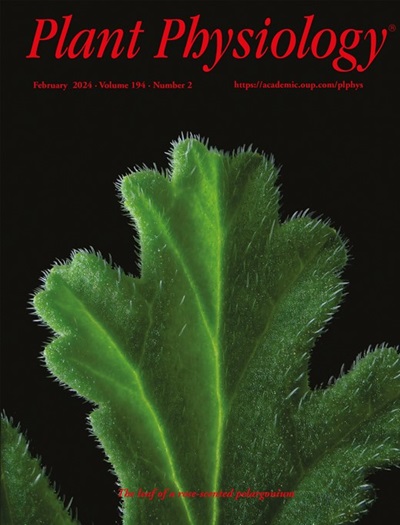赤霉素激活转录因子MdRAV1调控乙烯生物合成抑制苹果果实成熟
IF 6.9
1区 生物学
Q1 PLANT SCIENCES
引用次数: 0
摘要
植物激素乙烯对更年期水果的成熟至关重要,如苹果(Malus domestica)。赤霉素(GA)类植物激素通过一种未知的分子机制影响成熟过程中的乙烯生物合成。本文研究了气体对苹果果实成熟的影响。结果表明,苹果果实发育过程中,内源GA积累与乙烯生产相反。此外,外源GA处理抑制乙烯产生和果实成熟。然而,GA生物合成抑制剂促进了乙烯的产生,加速了苹果的成熟,这表明GA抑制了苹果的成熟。GA处理提高了苹果成熟过程中ABSCISIC ACID INSENSITIVE3/VIVIPAROUS1 (MdRAV1)相关转录因子的表达。DELLA蛋白GA不敏感(MdGAI)与MdRAV1相互作用,抑制其dna结合和调控活性。GA触发MdGAI的移除,从而释放MdRAV1。ga激活MdRAV1结合MdACS1的启动子,编码1-氨基环丙烷-1-羧酸(ACC)合成酶,直接抑制其转录。这些结果表明,ga激活的MdRAV1抑制MdACS1转录,减少乙烯产生并抑制果实成熟。本文章由计算机程序翻译,如有差异,请以英文原文为准。
The gibberellin-activated transcription factor MdRAV1 regulates ethylene biosynthesis to suppress apple fruit ripening
The phytohormone ethylene is vital for the ripening of climacteric fruit, such as apples (Malus domestica). The gibberellin (GA) class of phytohormones affects ethylene biosynthesis during ripening via an unknown molecular mechanism. Here, we investigated the effects of GAs on apple fruit ripening. We observed that endogenous GA accumulation was opposite to that of ethylene production during apple fruit development. Moreover, exogenous GA treatment suppressed ethylene production and fruit ripening. However, treatment with a GA biosynthesis inhibitor promoted ethylene production and accelerated fruit ripening in apple, suggesting that GA suppresses ripening. GA treatment enhanced the expression of the transcription factor Related to ABSCISIC ACID INSENSITIVE3/VIVIPAROUS1 (MdRAV1) during apple ripening. The DELLA protein GA INSENSITIVE (MdGAI) interacted with MdRAV1 and suppressed its DNA-binding and regulatory activities. GA triggered MdGAI removal, thereby releasing MdRAV1. GA-activated MdRAV1 bound to the promoter of MdACS1, encoding 1-aminocyclopropane-1-carboxylic acid (ACC) synthase, and directly suppressed its transcription. These results suggest that GA-activated MdRAV1 suppresses MdACS1 transcription, reducing ethylene production and suppressing fruit ripening.
求助全文
通过发布文献求助,成功后即可免费获取论文全文。
去求助
来源期刊

Plant Physiology
生物-植物科学
CiteScore
12.20
自引率
5.40%
发文量
535
审稿时长
2.3 months
期刊介绍:
Plant Physiology® is a distinguished and highly respected journal with a rich history dating back to its establishment in 1926. It stands as a leading international publication in the field of plant biology, covering a comprehensive range of topics from the molecular and structural aspects of plant life to systems biology and ecophysiology. Recognized as the most highly cited journal in plant sciences, Plant Physiology® is a testament to its commitment to excellence and the dissemination of groundbreaking research.
As the official publication of the American Society of Plant Biologists, Plant Physiology® upholds rigorous peer-review standards, ensuring that the scientific community receives the highest quality research. The journal releases 12 issues annually, providing a steady stream of new findings and insights to its readership.
 求助内容:
求助内容: 应助结果提醒方式:
应助结果提醒方式:


